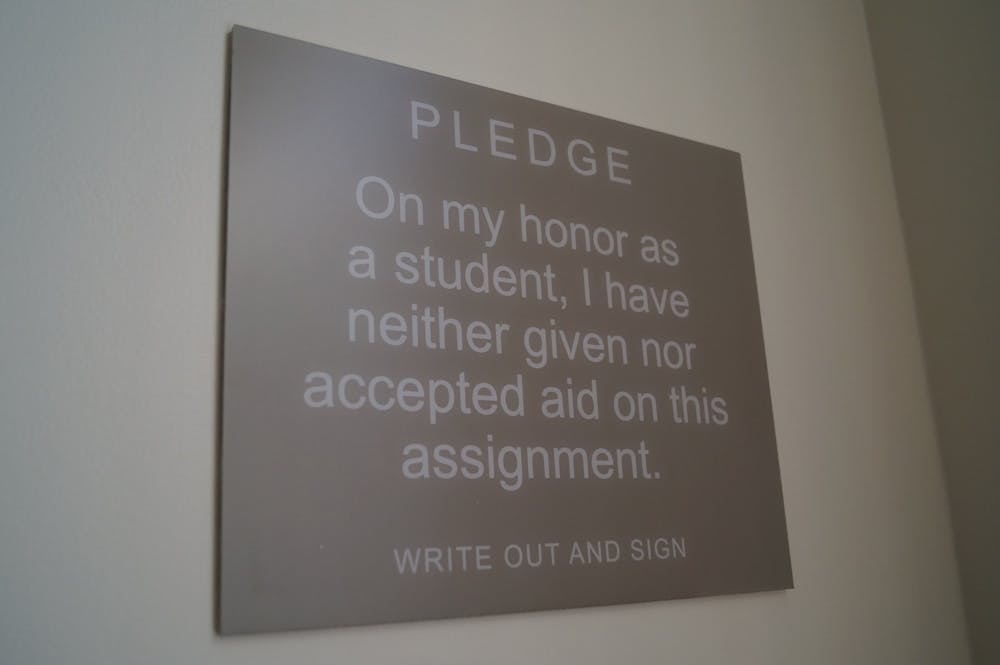Following the Honor Committee’s intense discussion surrounding constitutional referendum last semester — which did not result in a proposal being passed — Rep. Christopher Benos, third-year Law student, decided to take matters into his own hands by submitting two proposals to the University Board of Elections.
Throughout the course of the fall semester, the Committee considered five different proposals. The proposal Benos submitted ultimately fell short of being passed internally by the Committee multiple times, though the Committee was unable to vote at several of its final meetings due to attendance issues. The last time the Committee was able to bring Benos’ proposal to a vote in November, 14 members out of 19 members present voted in favor of the proposal.
Benos’ first proposal, “The Second Chance Reform,” would change Article II of Honor’s constitution by reducing the single sanction from expulsion to a two-semester leave of absence.
“To cultivate honest and compassionate citizens, our community needs to foster integrity instead of simply excising those who make mistakes,” the proposal reads.
The ethics of expulsion have long been debated — for those found guilty of an offense, expulsion can cause overwhelming despair and depression. Many members of the Committee, including Benos, favor a more rehabilitative sanction process that encourages education and recommitment to the University’s community of trust as opposed to outright expulsion.
Others argue that students who gain an unfair advantage by taking advantage of the community of trust do not deserve to stay because some offenses are egregious enough to require expulsion.
Benos’ second proposal is entitled “The Equal Access Reform” and would make amendments to Article V and VI of Honor’s constitution. If passed by the student body this spring, the referendum would allow students to plead guilty any time after they are accused, as long as they do so before their hearing. Currently, the constitution only allows for a seven-day period immediately following the accusation where the student may plead guilty — a process known as the Informed Retraction.
“Expanding the timeframe of pleas ensures that students can make informed choices about their academic futures,” the proposal reads.
After the Committee’s most recent meeting Sunday, Benos sent a Committee-wide email expressing “deep concern” over the group’s discussion surrounding The Cavalier Daily’s three-part investigative series into the Committee's internal debate last fall. Honor Committee representatives spent the vast majority of Sunday’s meeting discussing the investigation and questioning Andy Chambers, chair of the Honor Committee and fourth-year College student, abou his involvement in making a donation to U.Va. Mutual Aid and e-mail correspondence with UBE.
“Our Committee’s work must not be tainted by any appearances of impropriety,” Benos wrote. “Our policies must not chill student speech.”
To be included on the ballot this spring, both referenda proposals must acquire 1,250 petition signatures. If the proposals reach the designated number of signatures, each must be ratified by a supermajority of 60 percent of students voting in a referendum election, provided at least ten percent of the entire eligible voting population — about 2700 students — has voted in favor of the amendment.
Students can currently virtually sign both petitions on UBE’s virtual petitions page.
Historically, the number of students who have voted on the proposed referendum has hovered right around 10 percent. Last spring, the Honor Committee chose not to introduce any referenda. The year before, barely 9 percent of students participated in student body elections. As such, all proposed referenda failed to pass.
The last day to submit a proposal to the UBE is Feb. 5 at 4 p.m.
CORRECTION: A previous version of this article incorrectly quoted Benos' first proposal. The article has been updated to correct this error. Additionally, a previous version of this article incorrectly stated the thresholds needed to pass an amendment to the Honor Committee's constitution — the article has been updated to correct this error.







